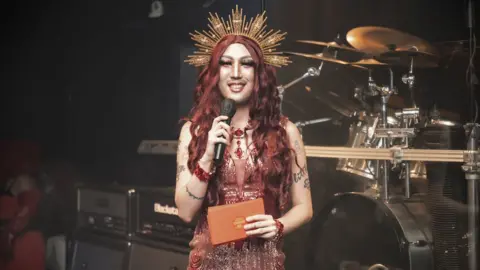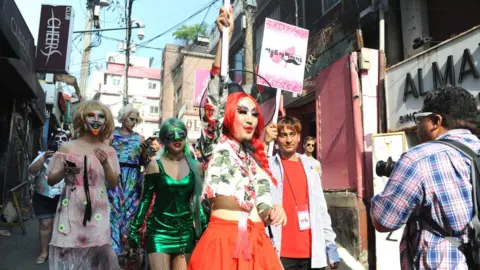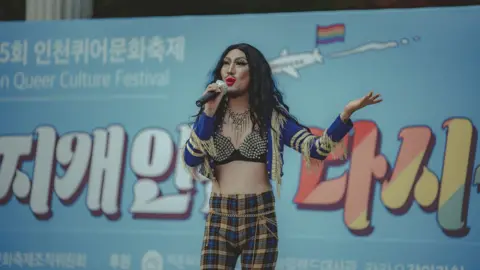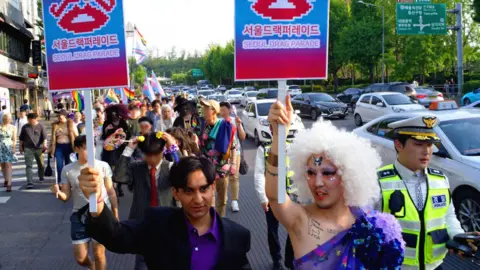The South Korean drag queen raising LGBT awareness
 Kim Moonyang
Kim Moonyang"When I first tried drag, I didn't know what it would be like and how into it I would be. It gave me some sort of empowerment and liberation," says Heezy Yang.
Yang has been performing as his drag act Hurricane Kimchi for almost a decade, taking part in a number of events including Seoul Pride in South Korea's capital.
"There are thousands there in the audience at Seoul Pride and I feel like I'm a superstar. I get the tingles and a real adrenaline buzz," Yang tells the BBC. "I enjoy interacting with people and getting energy from a big crowd."
He tried drag for the first time after seeing friends do it and realised it could be a tool to combine his activism and love of the arts.
"The first few times I didn't have any agenda. I did it for fun," he says. "The more I did drag, the more I performed, I could see how I could use it and how I could enjoy it."
Drag isn't as common in South Korea compared to other countries like the UK and US. Yang admits a few eyebrows can be raised when he goes out in public dressed as Hurricane Kimchi.
"In the streets sometimes I go to a drag show with my face on, people would be confused," he says. "I've never felt physically threatened being in drag in public spaces although I am aware that people may be thinking negatively or looking at me in a negative way."
 Sangsuk Sylvia Kang
Sangsuk Sylvia KangSouth Korea has no anti-discrimination laws protecting LGBT people and same-sex marriage is not recognised. Being LGBT is often seen as a disability or mental illness. Some powerful conservative churches consider being gay or trans a sin. A report by Human Rights Watch last year found that discrimination against LGBT people in the country is "pervasive".
Yang says that both drag and LGBT culture is still new to older generations who can often be confused, but younger Koreans are more aware of drag culture.
"They grew up watching Hollywood movies and things like Ru Paul's Drag Race so they are very supportive and accepting. Even if they didn't know what drag was, they have quickly learned things. There is a gap between generations but I am very positive about what is to come," says Yang.
He sees the positive influence drag can have when attending smaller pride events in cities that might not have a widely established LGBT scene.
The crowds are smaller, but it means that young people get to experience the festivities and be a part of the LGBT community.
"It's very meaningful to be able to be there and perform for them," he says.
Yang also likes to bring LGBT issues to people's attention, choosing to take part in protests while in drag, and bringing awareness to the government's policies towards the community.
 Incheon Queer Culture Festival
Incheon Queer Culture Festival"I'm a bearded queen and I don't always do sexy, trendy performances. I like to do protest and political performances as well. It's also important for me to give back to the community and be supportive to other people in the community," Yang says.
"If we want to achieve things and get things done, we should raise our voice and be seen. People should be aware that we are here and we are just like them and have human rights."
Yang's love of drag and the idea of representing it on a bigger scale led him to co-create Seoul Drag Parade in 2018.
"I thought I would gather maybe 20 or 30 people and we would just have fun and hang out. At the end of the night, the number of people who had taken part in festivities throughout the day were about 1,000 people. It was overwhelming but good," he recalls.
The parade was held online during the pandemic but it is hoped that this year it will return to an in-person event. Yang aims to host it in Itaewon, an area of Seoul that has a number of LGBT-owned bars. The area has been hit financially by the pandemic and more recently, the Itaewon crush in which 159 people died. A number of LGBT businesses are struggling financially as visitor numbers diminished.
 Argus Paul
Argus PaulDrag and events like Seoul Drag Parade have "buoyed the LGBT community in Korea," says Todd Henry, associate professor of history at the University of California, San Diego.
"If you asked someone 20 years ago what a drag queen is, I don't think they would have had any idea what you were talking about. They probably would have mistaken that person for transgender. In this sense, activities led by individual drag queens and by drag queen communities have expanded historically binary understandings of genders and sexualities," he says.
He adds that at pride festivals, a number of allies show up to support drag acts and also support the LGBT community.
"In recent years, self-identifying 'sexual minorities' (including many drag queens) and their progressive supporters have increased to more than 100,000 a year at City Hall or wherever else the Seoul Pride Festival is hosted. I'm optimistic about what is to come," he says.
For Yang, his focus is on continuing his drag and bringing the community together.
"Sometimes on social media I get messages and comments from people thanking me for the events that I host and the fact I make my events accessible and friendly. I like to think I open doors for people and they appreciate it. It makes me happy."
